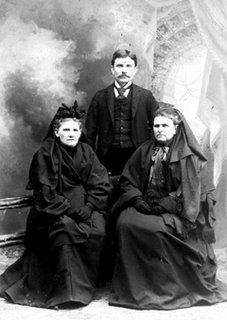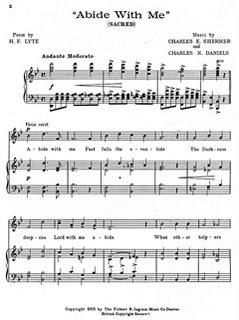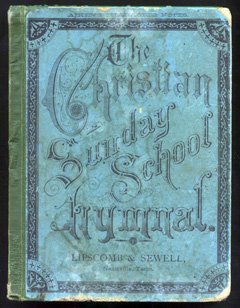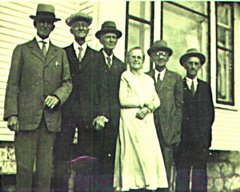LONG WEEKEND...
A LONELY HYMN and A SOCIAL SPREAD...
 My mother drove over today to go to the funeral of the husband of her best friend from high school [they are both now 80]. I met her at the church and we went up to the reception at the house together. Now I hardly knew the husband, but her best friend is an easy-going, outgoing woman who has always been extremely cordial to me. Her husband was self-effacing to the point that even people who had been his neighbors for years had no idea, for instance, that he had designed science experiments that were taken to the moon in that "one great leap for mankind" in 1969. I learned a lot at his funeral, as one usually does. But not just about him.
My mother drove over today to go to the funeral of the husband of her best friend from high school [they are both now 80]. I met her at the church and we went up to the reception at the house together. Now I hardly knew the husband, but her best friend is an easy-going, outgoing woman who has always been extremely cordial to me. Her husband was self-effacing to the point that even people who had been his neighbors for years had no idea, for instance, that he had designed science experiments that were taken to the moon in that "one great leap for mankind" in 1969. I learned a lot at his funeral, as one usually does. But not just about him. I am allergic to a lot of what passes for "Christian" sentiment, especially when it crosses [crosses? most of the time it cascades] over into sentimentality. If I ever hear "Blest Be the Ties That Bind" again in my life, it will be too soon. And until today, I would have gladly dropped "Abide With Me" into the shredder along with it.
I am allergic to a lot of what passes for "Christian" sentiment, especially when it crosses [crosses? most of the time it cascades] over into sentimentality. If I ever hear "Blest Be the Ties That Bind" again in my life, it will be too soon. And until today, I would have gladly dropped "Abide With Me" into the shredder along with it.But something happened today. I listened to my pastor, my former pastor, speak of the couple's fifty-six year marriage ended only by death, and could think only of my taking the twenty-seven years of my life and trading it for what? A mess of pottage? or merely a mess?
Abide with me; fast falls the eventide;
The darkness deepens; Lord, with me abide.
When other helpers fail and comforts flee,
Help of the helpless, O abide with me.
 Some of it was simply that I am dealing with what, rightly or wrongly, seems like a death. The death of myself as I knew me, the death of the third person that my wife and I created for each other and called our marriage, the death of my life in my house and with my children...
Some of it was simply that I am dealing with what, rightly or wrongly, seems like a death. The death of myself as I knew me, the death of the third person that my wife and I created for each other and called our marriage, the death of my life in my house and with my children...Suddenly the sense of being so completely at a loss without the "help of the helpless" was so clear that my throat clamped shut. I had sung the first verse where I thought I would be more comfortable, down at the bottom of my range, but then I realized that no one in the church was audible, including me. But I knew I could sing it: and apparently no one else knew the tune, in spite of the organist playing it through once. I was going to have to sing out.
Swift to its close ebbs out life's little day;
Earth's joys grow dim; its glories pass away;
Change and decay in all around I see;
O thou who changest not, abide with me.
So I cranked it up an octave [my voice lies directly split over every hymn arrangement I have ever met in a hymnal -- someday I would like to find some music that actually fits my range] and tried to sing out. My mother stood next to me, obviously at sea with the hymn, but also with an ear so fully tinned that she can't even follow the up and down directions of the notes... But the worst of what I was hearing was from the inside: my throat would not open up to let the voice out, and the strangled, sobbing noise I was making was coming from my throat and not from my gut. I can already feel the shreds starting to complain...
I need thy presence every passing hour.
What but thy grace can foil the tempter's power?
Who, like thyself, my guide and stay can be?
Through cloud and sunshine, Lord, abide with me.
 But the most worrisome thing was that there was almost no one in the church who could sing the song. Even after several verses had gone by. There was no swell, no joining, just a few weak voices; I mean in no way to brag when I say that mine was probably the strongest voice there was -- that was the problem: it was a mess... And what was keeping my throat tied tight was the simple acknowledgement of weakness and death, of where I was and where I was going...
But the most worrisome thing was that there was almost no one in the church who could sing the song. Even after several verses had gone by. There was no swell, no joining, just a few weak voices; I mean in no way to brag when I say that mine was probably the strongest voice there was -- that was the problem: it was a mess... And what was keeping my throat tied tight was the simple acknowledgement of weakness and death, of where I was and where I was going...I fear no foe, with thee at hand to bless;
Ills have no weight, and tears no bitterness.
Where is death's sting? Where, grave, thy victory?
I triumph still, if thou abide with me.
Now, that is one of those things that mean everything if you believe it, and nothing if you don't. My problem is that I do, and yet there I sat, bowing to the sting of death and giving the grave the victory. But the promise of those words just about undid me. I was overwhelmed by my sudden feeling for the widow, feeling so powerfully my own loss, and the absolute certainty that suffering is what we have in common as human creatures. The tighter my throat got, the more my tear ducts opened up...
Hold thou thy cross before my closing eyes;
Shine through the gloom and point me to the skies.
Heaven's morning breaks, and earth's vain shadows flee;
In life, in death, O Lord, abide with me.
 We sat down. This was the only hymn in the service, and the woman who played the organ was a pianist struggling mightily to conquer a more complicated instrument. She did pretty well, but hadn't learned the little tricks that make life bearable: introducing a rest where the congregation needed to breathe, especially between verses. We actually had a "sermon talk-back" about ten years ago which turned into a complaint forum about the fact that our organist had no speed above legato; but at least she let us breathe...
We sat down. This was the only hymn in the service, and the woman who played the organ was a pianist struggling mightily to conquer a more complicated instrument. She did pretty well, but hadn't learned the little tricks that make life bearable: introducing a rest where the congregation needed to breathe, especially between verses. We actually had a "sermon talk-back" about ten years ago which turned into a complaint forum about the fact that our organist had no speed above legato; but at least she let us breathe...And once again it washed over me. An academic audience. An audience, not a congregation. Someone had selected the hymn without considering that nobody there knew it, or would be able to sing it. [Probably my well-intentioned pastor friend...] And then there was me in the middle of it, weeping like there was no tomorrow, or as if the man his family mourned had been my intimate companion. But it was my own sorrow I was giving vent to: the same sorrow that my on-board guardian otherwise lets out for only five or ten seconds at a time...
 The last time I attended an all-academic funeral, it was of a brilliant botanist, whose family was ethnically Jewish but basically areligious or even anti-religious, and those present were just as "liberated", just as superior to religion in every way as our congregation today, but God almighty, when the rabbi intoned the Kaddish, every male in that room suddenly joined in -- a song thousands of years old that every son has sung at least once in his life... and for all the enlightenment, so called, of the Enlightenment, had never failed to learn. The hair stood up on the back of my neck. THAT was tradition. We seem to traded ours for a mess of pottage [now where have I heard that before?], or whatever the new translations dish out in its place.
The last time I attended an all-academic funeral, it was of a brilliant botanist, whose family was ethnically Jewish but basically areligious or even anti-religious, and those present were just as "liberated", just as superior to religion in every way as our congregation today, but God almighty, when the rabbi intoned the Kaddish, every male in that room suddenly joined in -- a song thousands of years old that every son has sung at least once in his life... and for all the enlightenment, so called, of the Enlightenment, had never failed to learn. The hair stood up on the back of my neck. THAT was tradition. We seem to traded ours for a mess of pottage [now where have I heard that before?], or whatever the new translations dish out in its place.The reception at the house where my mother's friend's husband had drowned during an afternoon swim almost a year ago was incredible, laid out for easy grazing, no servants, no service, just family and friends and a ton of food. Including a ton of shrimp, of which I think I single-handedly consumed half a ton.
I once worked on a Broadway show so expensive that the producers knew that the investors would never do more than break even, even if it sold out its limited run completely. So they decided to throw the opening night party to end all opening night parties. You gave up your coat at the coat-check, and the first thing you hit on heading for the ballroom was a table easily eight feet long, heaped with shrimp. In retrospect the heap seems to have been about shoulder- to head-high. I stood at that table for about half an hour, picking one shrimp after another off the astonishing heap, completely consumed by the prospect of such excess at my disposal... The excess continued through dinner, which I also managed to down...
 When my North Carolina sister got married the second time, she had a lunch for the family members who had come south for the event. It consisted of a great big pot of red sauce and an even bigger pot of shrimp. We were so engrossed in taking care of the crustaceans that we didn't think to stop and clean up until just before the wedding guests arrived: the civil ceremony was to be performed right where we were busy smearing red sauce onto napkins and the newspaper [the very small-town rag my sister wrote for] underneath. But we did manage; my sister even managed to get dressed for the occasion. And stayed as cool as as cucumber through it all. Until she had to stand next to him and say those words in front of all of us. And suddenly, these two Mature People who had approached their second wedding with all the cold-blooded efficiency of sharks, began to melt, and blush, and stutter, and show profound emotion. And we all looked at each other and smiled smiles that came from the same depths as today's tears.
When my North Carolina sister got married the second time, she had a lunch for the family members who had come south for the event. It consisted of a great big pot of red sauce and an even bigger pot of shrimp. We were so engrossed in taking care of the crustaceans that we didn't think to stop and clean up until just before the wedding guests arrived: the civil ceremony was to be performed right where we were busy smearing red sauce onto napkins and the newspaper [the very small-town rag my sister wrote for] underneath. But we did manage; my sister even managed to get dressed for the occasion. And stayed as cool as as cucumber through it all. Until she had to stand next to him and say those words in front of all of us. And suddenly, these two Mature People who had approached their second wedding with all the cold-blooded efficiency of sharks, began to melt, and blush, and stutter, and show profound emotion. And we all looked at each other and smiled smiles that came from the same depths as today's tears.In the final analysis, complete joy and complete sorrow are so close that they can be mistaken for each other, and cross into each other in ways that cut your knees out from under you. The pangs of joy [the night my wife agreed to marry me, for instance] can be completely indistinguishable from the ache of sorrow. We can even weep for joy...
 And part of what I saw, what I had to say as I made my good-byes after my mother had taken off for her home and the paying guests she expected, was that this kind of event shows you what family really is: a growing together, a growing out from a common center that still allows you to connect and live together in peace, if only briefly... a shared life.
And part of what I saw, what I had to say as I made my good-byes after my mother had taken off for her home and the paying guests she expected, was that this kind of event shows you what family really is: a growing together, a growing out from a common center that still allows you to connect and live together in peace, if only briefly... a shared life.And this is what I have chosen to leave. Or to force into some cruelly different new shape... by my own choice. It's hard to say, and harder still to watch the process.
I cannot sing that hymn without crying. At a funeral i would have been weeping floods. And in your situation . . . . .
ReplyDeleteNigel